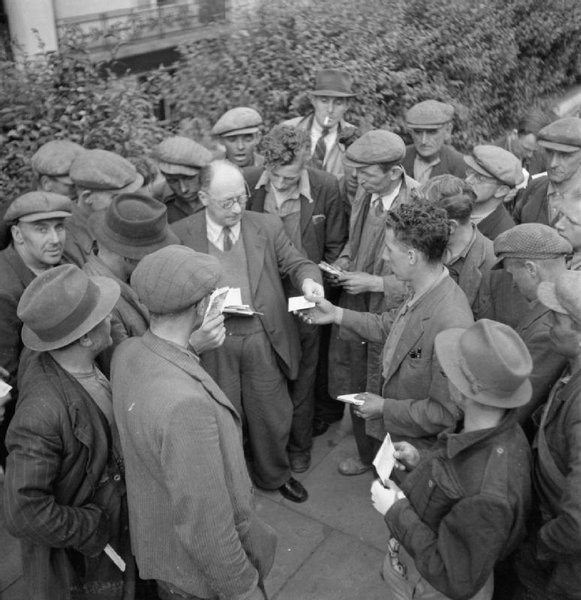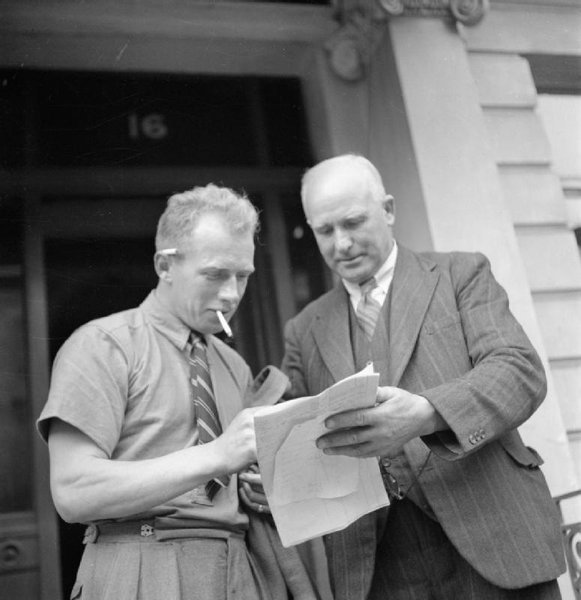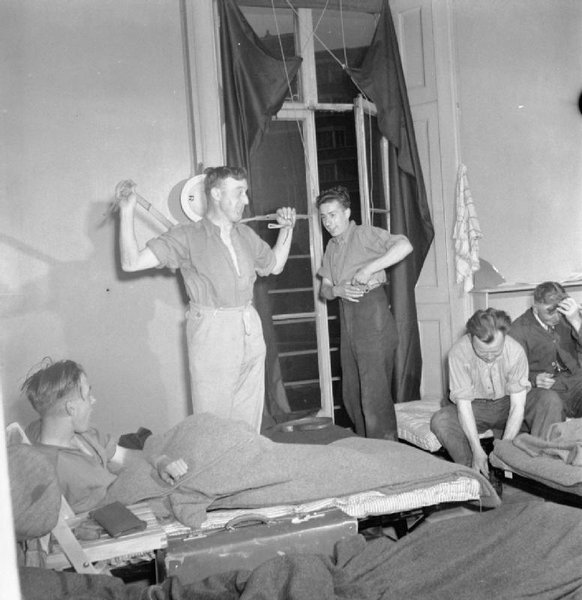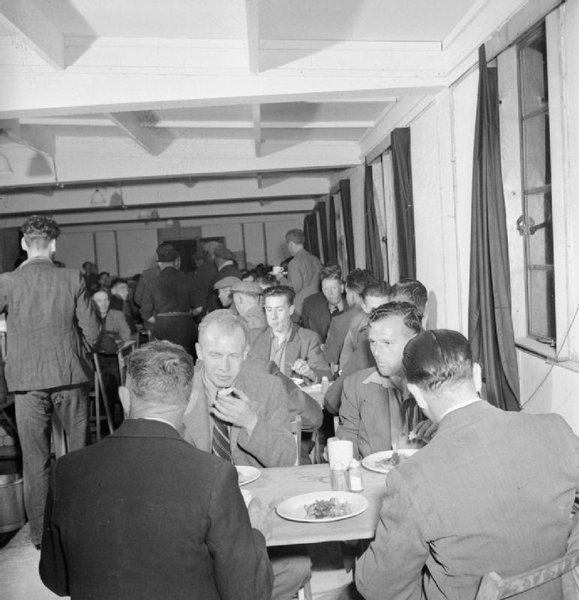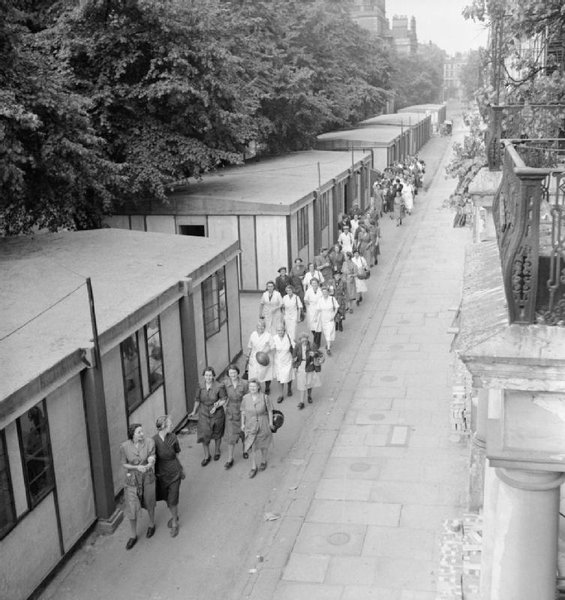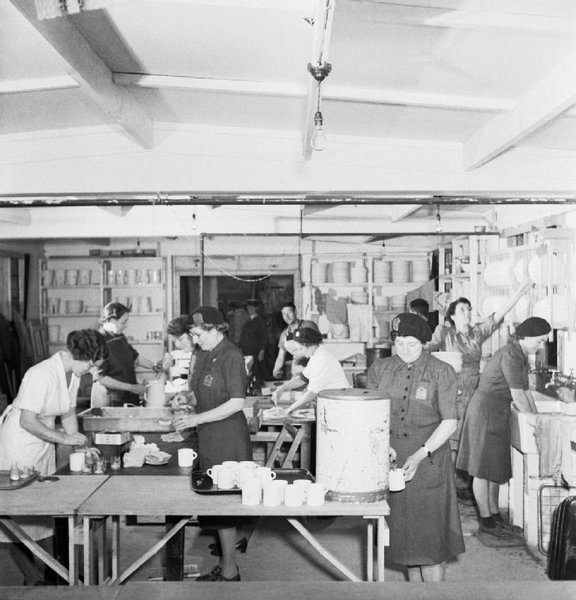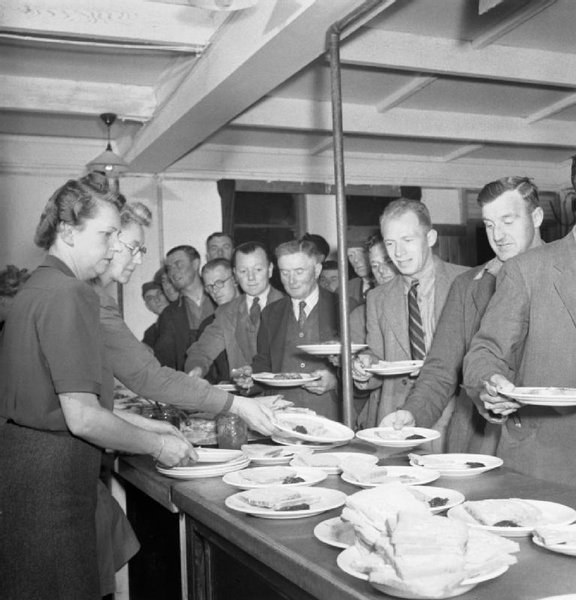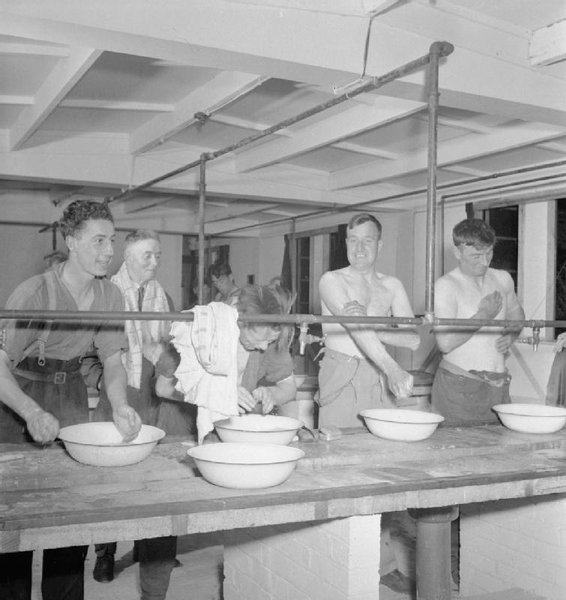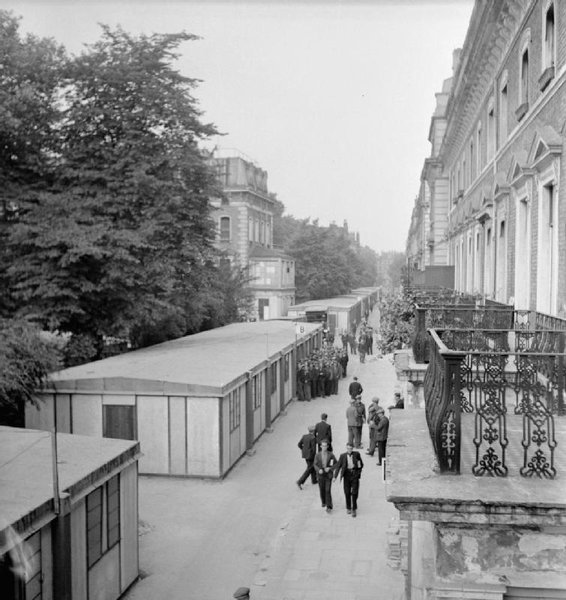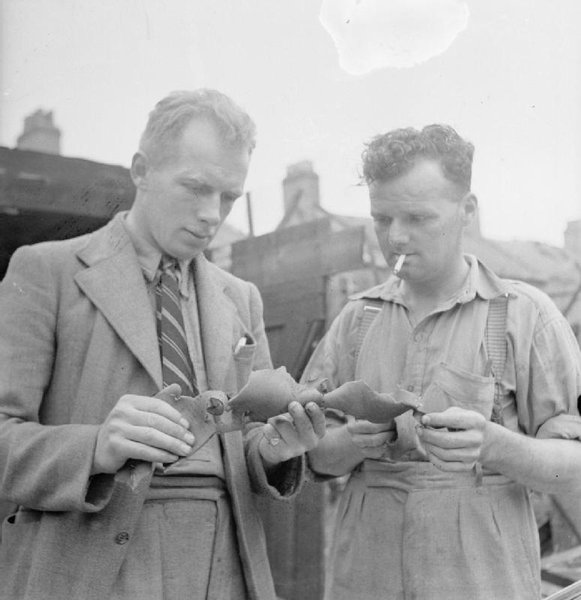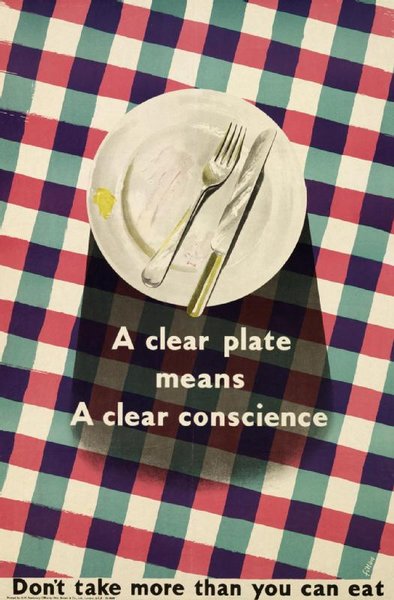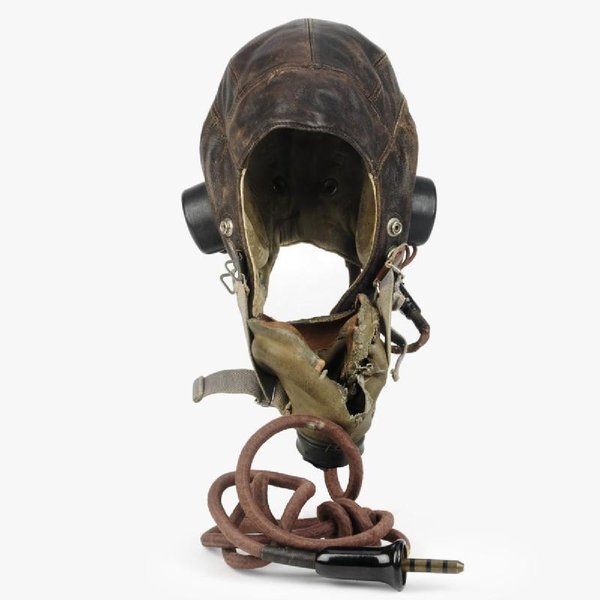High Explosive Bomb at Earl's Court Road
Description
High Explosive Bomb :
Source: Aggregate Night Time Bomb Census 7th October 1940 to 6 June 1941
Fell between Oct. 7, 1940 and June 6, 1941
Present-day address
Earl's Court Road, South Kensington, Royal Borough of Kensington and Chelsea, SW5 9NB, London
Further details
56 18 NW - comment:
Nearby Memories
Read people's stories relating to this area:
Contributed originally by Stephen Bourne (BBC WW2 People's War)
My Aunt Esther was a black working-class Londoner, born before World War 1. Her life spanned almost the entire century (1912 to 1994).
Her father, Joseph Bruce, settled in Fulham, west London, during the Edwardian era when very few black people lived in Britain. He came here from British Guiana (now Guyana) a colony in South America. He was a proud, independent man.
Aunt Esther left school at 14 to work as a seamstress and in the 1930s she made dresses for the popular black American singer Elisabeth Welch. After Joseph was killed during an air raid in 1941, Aunt Esther was 'adopted' by my (white) great-grandmother, Granny Johnson, a mother figure in their community.
Esther said, 'She was like a mother to me. She was an angel.' For the next 11 years Aunt Esther shared her life with Granny (who died in 1952) and became part of our family.
During World War 2, Aunt Esther worked as a cleaner and fire watcher in Brompton Hospital. She helped unite her community during the Blitz and having relatives in Guyana proved useful when food was rationed.
She said, 'Times were hard during the war. Food was rationed. Things were so bad they started selling whale meat, but I wouldn't eat it. I didn't like the look of it. We made a joke about it, singing Vera Lynn's song We'll Meet Again with new words, "Whale meat again!" Often Granny said, "We could do with this. We could do with that." So I wrote to my dad's brother in Guyana. I asked him to send us some food. Two weeks later a great big box arrived, full of food! So I wrote more lists and sent them to my uncle. We welcomed those food parcels.'
In 1944 the Germans sent doodlebugs over. Said Aunt Esther, 'When the engine stopped I wondered where it was going to drop. It was really frightening because they killed thousands of people. A doodlebug flattened some of the houses in our street. Luckily our house was alright, even though we lived at number thirteen!'
In the late 1980s I began interviewing Aunt Esther and in the course of many interviews I uncovered a fascinating life history spanning eight decades. Aunt Esther gave me first-hand accounts of what life was like for a black Londoner throughout the 20th century. A friendly, outgoing woman, my aunt integrated easily into the multicultural society of post-war Britain. In 1991 we published her autobiography, Aunt Esther's Story, and this gave her a sense of achievement and pride towards the end of her life. She died in 1994 and, following her cremation, my mother and I scattered her ashes on her parents' unmarked grave in Fulham Palace Road cemetery. Granny Johnson rests nearby.
Contributed originally by ageconcernbradford (BBC WW2 People's War)
This story was submitted to the People`s War site by Alan Magson of Age Concern Bradford and District on behalf of Malcolm Waters and has been added to the site with his permission. The author fully understands the site`s terms and conditions.
The war against Germany was declared in 1939.
My parents had already separated, fortunate for me I stayed with my Father and my Sister Nora went with Mum.
Nora was really my half sister 6 years my senior yet I never looked on her other than my whole sister.
Nora’s name was Robinson, my Mother’s maiden name. Nora eventually left home to join a circus.
Dad, an ex regular soldier, who served with the Northumberland Fusiliers in the first world war, there was very little he could not put his hands to. He baked all our bread, a brilliant gardener, was a very good cook and kept our home spic and span.
Sadly he rarely talked about his life so I really never found out much about him. I know he was a Geordie and had a brother Billy, but what part of Newcastle I have no idea.
End of January 1940 was a very bad winter. Dad jumped off the running board of a bus, slipped and struck his head on the kerb. He had a stroke and died on the 10th February in St Johns Hospital, Keighley.
Going down Airwarth Street my Uncle Joe told me my Dad was dead. His last words were the start of my Christian name MAL then he passed on. I must emphasise the point my Dad was a brick, he lived for me. I did cry at night when I was alone, realising I would never see or hear his face or voice again.
My life changed so much that at times I lived with my schoolmate Ken Smith, we both worked in Edmondson`s Mill, Keighley as doffers. The foreman threw a bobbin at me as I was sat on a bobbin box and I threw as many back at him and got the sack.` I left to work in a steel works shovelling steel into a foundry, then I did some lumber jacking at Oakworth, Keighley. I ended up at Doublestones Farm in service above Silsden for the Fothergills. I spent six months from 5am until 11pm at night building walls, shearing sheep, dipping sheep, harnessing the horse, burying dead sheep, milking the cows, feeding and mucking out.
Keighley was normal, one hardly knew a war was on, working on a farm was even more remote. After six months farming, I asked Fothergill, can I go to Keighley Fair on Saturday afternoon. He said, “what am I going to do without you”. So I went to the fair and never returned to farming.
Mum and I went to London after the Blitz, even then night and day bombing was daily. You could hear the distinctive drone of Jerry as they gradually got nearer and the bombs got nearer. When we arrived in Fulham we had no money, looking for a Mrs Quinn who had left her flat leaving no forwarding address so Mum and I went knocking on doors until a Mrs Lampkin put us up. Mum was probably desperate having no money and no job. I must have been a burden to her.
I went to school at Ackmar Road with some of Mrs Lampkin’s boys. I adapted to life quickly and made the best of it. Mum then decided London was too dangerous, so she sent me to Ponterdawee South Wales as an evacuee. I well remember saying good bye to Mum stood on Paddington Station with my overcoat on, a label with my name and destination, my gas mask, identity card, ration books and teachers who were taking care of us. We arrived at night time in a schoolroom in Ponterdawee where our names were called out, a person stepped forward and took my hand a man and his son were my carers. I cannot remember their names, but his son was about my age so he taught me the ways of the Welsh. I quickly adapted getting free coal from the slag heaps. Taking the cows to the bull and getting diced cheese with brown sauce. I enjoyed my stay in Wales. I was treated very well.
Mum had established herself in Fulham she had a flat, then Nora came back into our lives again. She had blossomed into a bonny young woman who looked after me. At Ackmar Road schoolboys used to play pitch and toss, this was new to me as in Yorkshire gambling was not even on the cards. I can remember on Christmas going out singing carols to get Mum a Christmas card. She cried.
Nightly, the sirens went the whole sky was lit up with searchlights, I got fed up with getting out of bed. When Nora shouted of me to go down into the basement I said okay, you go on, I’ll follow you.
I could hear the bombers getting nearer and nearer, still lying in bed. Then I heard a whistling bomb that landed too close for comfort, my first reaction was to dive under the bed, my next reaction was to get down them stairs post haste. Nora was stood looking out of the back window, we were surrounded by buildings on fire. We were transfixed in awe at the blazing buildings, fire engine bells ringing, police cars whistles blowing, but we soon shot into the basement. Mum was on night work but the old lady always made us welcome. It got so bad at times we went to sleep on Piccadilly Station 75 feet below ground. Nora joined the ATS, I saw very little of her till later in life. One of the most frightening experiences was the mobile, ack ack guns that went off right outside our front door shaking all the windows. Most houses had stirrup pumps and buckets of sand just in case an incendiary came close.
Mum remarried a Peter Johnston from Tipperary In Ireland, he was an RSM in the Royal Engineers. He always respected me and was a real good family man, he always brought something home for me, but I am really a loyalist. I loved my own Father so much I could not accept another Dad, sad in a way, because he was a father of eight children who went in the Children’s Home in Keighley. They were all good children who’s mother fell down the stairs and broke her neck. Mum and I went to live in Townhead Glasgow to be near Peter who was stationed in Inverary. I went to school in Townhead I joined the Boys Brigade and was also a Lather Boy in a Barbers Shop. We got a bus from Robertson Street to Inverary went up the Rest and be thankful to arrive to see some real military movement. Assault craft, vehicles running backwards and forwards obviously getting ready to go to Dieppe. I slept in a huge bell tent while Mum and Peter went off to a Hotel. Peter was a very musical man he ran the Isle of Capri Band up Woodhouse, Keighley, an accordion and kazoo band who were very very good, they won many cups and shields, parading them around the Wood house Estate (pre War)
Back in London again in OngarRoad, Mum had a flat. Peter committed bigamy so Mum was on her own again. I remember going back to Keighley to spend my last days at Holycroft Board School, then back to London again. I got a job with the Civil Defence at Chelsea Town Hall and joined the London Irish Rifles Cadet Corps at Chelsea Barracks as a cadet soldier. As a messenger boy in the Civil Defence I cycled round the streets in uniform and my steel helmet on to various people of notoriety including the Chelsea Pensioners. Mum got a job in Peterborough looking after a man and his son, again his son was around my age, he was a brilliant young artist. He drew Peterborough Cathedral very professional. One day I went to Yewsley right next to the American Fortress Base. Looking up in the sky I could see and recognise a Jerry plane diving straight toward the street I was in. I ran like hell resting behind an Oak tree in a church yard watching the plane strafing the main street with cannon shelling, a close call.
I also worked in Dubiliers factory at Acton, making gallon petrol cans and we listened to " Music While you Work ". I also in Grosvenor House,Park Lane as a paticia`s assistant and the Americans occupied the hotel in the war years.
While in the Civil Defence I saw vapour trails of V2 rockets that landed somewhere toward Westminster. I went to Romford one night to stay at Harry`s, my mate`s house, as usual the sirens went moaning Minnie. It was like watching a film show looking over London with the bombers dropping canisters full of incendiaries. I commented to Harry, someone is getting a pasting, I found out Fulham had been hit again, a friend of Mum’s showed me his burnt shoes caused by kicking an incendiary out of the house. Everywhere was devastation, doors burned, windows blown. One chap, playing the piano had an incendiary pass through the roof straight between him and the piano into the next floor. I went to Putney one day, as normal, sirens sounded, my bus stopped on Putney Bridge, coming up the Thames was a V1, a buzz bomb, I watched it from the top deck coming right above the bus. The engine stopped. I watched it glide into a block of flats at Barns Bridge. I had the windows open, I felt the blast on my face from approximately half a mile away. One day I saw a squadron of 13 V1’s passing overhead in Gloucester Road, South Kensington.
The Army used to train on Harden Moor leaving unexploded bombs lying around. Two of my schoolmates playing with an unexploded PIAT bomb were blown to pieces in Lund Park, Keighley. Another friend Alec Joinson tried to saw through a grenade detonator, his face and arms were pitted with splinters he was covered in Sal volatile and was partially deaf.
I was very very lucky boy to be here to tell my story, I picked up a pop bottle that looked like bad eggs, fortunate for me I did not have a bottle opener so I through the bottle into a quarry. You should have seen the bright yellow phosphorous I’d picked up a Molotov cocktail, a phosphorous bomb.
Nora, my Sister, was in an air raid shelter that was hit and became flooded. She developed pneumonia then consumption. She spent many years in hospital and despite doctors warnings she had two children. At 43 neglected by her husband, she died and was cremated in Norwood Crematorium. She was a very very good mother who wasted away to a living skeleton. She spent many months in Brompton Hospital, I made all the funeral arrangements, the husband pleaded ignorance. I always enjoyed going to see her in London when I returned to Keighley later in life. I loved Nora very dearly and she never complained about all she suffered. Tommy Junior and Jenny still live in London, at Herne Hill. I occasionally call to see them.
The spirit of the Londoners in those dark days was second to none. We sang on the stations. I sang on Keighley Station when Ken Smith’s Father in Full Service marching order was off to Dieppe. Everyone sang “ wish me luck as you wave me goodbye” and “for a while we must part but remember me sweetheart “. Vera Lynne, Ann Shelton, Tommy Trinder, Arthur Askey, Flanagan and Allen and the Crazy Gang all made for good entertainment. Not forgetting George Formby and Grace Fields.
I am now 76 years old. Today I doubt the law would look on a single man like my Dad and the Gentleman in Wales as being capable of taking care of a family.
Contributed originally by Suffolk Family History Society (BBC WW2 People's War)
Of course, 'way back in the 1930's "teenagers" hadn't been invented. In those now far off days one remained a 'child' -dependent on, and obedient to one's parents for more years than is often the case now, and the age of 'Majority', supposed adulthood, was 21, when you got the 'key of the door'. So, in the early 1930's, having moved to Acton from Kensington, where I was born in the 1st floor flat of 236, Ladbroke Grove, I grew towards my 'teens, enjoying a secure and happy childhood, doing reasonably well at School (Haberdashers' Aske's Girls' School, Creffield Rd) making friends and with freedom to play outside, alone or with my friends, and with no thought of danger from strangers, or heavy traffic.
And so, in 1939, I was 13 years old, when the war began. We had been on holiday in Oban, Argyll, where I now live, and as the news became more and more grave, and teachers were called back to help to evacuate school children from London, and Army and Navy reservists were called up, we travelled by car across to Aberdeen on Saturday 1st Sept. After a night in the George Hotel, and thinking the Germans were already bombing us when a petrol garage caught fire and cans of petrol blew up one after another, we caught the 9am train to London, Euston. The car travelled as freight in a van at the rear of the train (no Motorail then). The train was packed with service personnel, civilians going to join up and other families returning from holiday.
All day we travelled South. On the journey, there were numerous unscheduled stops in the 'middle of nowhere', and a severe thunderstorm in the Midlands added to the tension. Our car, in its van was taken off the train at Crewe to make room for war cargo (as we learned later). In normal times, the journey in those days took 12 hours to London. With the storm, numerous delays, and diversions and shunting into sidings, it was destined to take 18 hours. As darkness fell, blackout blinds already fitted, were pulled down and the carriages were lit by eerie dim blue lights. Soldiers and airmen sprawled across their kitbags in the corridors as well as in the carriages, sleeping fitfully. Nobody talked much.
Midnight passed, 1am. At last around 2am, tired, anxious and dishevelled, we finally arrived at Euston station on the morning of Sunday September 3rd.
My Mother and I sat wearily by our luggage in the vast draughty booking hall while my Father went off to see if, or when the car might eventually arrive. There was no guarantee. There were no Underground trains running until 6am, and, it seemed, no taxis to be had. In the end we sat there in the station forecourt until my Father decided that he could rouse his brother to come and collect us and our luggage. And so we finally reached home, had a brief few hours' sleep and woke in time to hear Mr Chamberlain, the Prime Minister, make his historic 11am speech. Those who remember it all know the icy shock of those words, that - 'consequently we are now at war with Germany'.
The air-raid sirens sounded almost immediately, though it was apparently a false alarm, but my parents decided that we would go and live at our country 'bungalow' at Ashford, Middlesex. Ashford in those days was little more than a village. London airport was a small airfield called Heathrow.
The 'bungalow' was simply one large wooden-built room, set on brick pillars, and roofed with corrugated asbestos, painted green, with a balcony surrounded by a yellow and green railing. Three wooden steps led down into the garden. Two sash windows gave a view of our large 3 acre garden, curtained with floral -patterned chintz curtains. Inside at one end was a sink fed by a rainwater tank, and an electric cooker, a large table, chairs and a large cupboard for crockery. Normally, we had, pre-war, used it for summer evening or weekend visits, returning home at night. It was only a six mile journey along the Great West Road.
Now, though, with war declared hurried preparations were made to leave London, as my parents didn't know what might happen in the way of possible attack on the Capital. Several journeys were made by car with mattresses, bedding, food, extra utensils, clothes and animals (two cats and two tortoises). The cats roamed free, having previously been used to the garden when we went on holiday, when they were housed in the bungalow and fed and cared for by our part-time gardener. They loved the freedom and the tree-climbing and never went astray. The torties, though, had to be tethered by means of a cord through a hole drilled in the back flanged edge of the shell (this is no more painful than cutting one's nails) until a large secure pen could be made, and a shelter rigged up.
My Father's brother joined us, his wife and son having already left for safety, and to be near his son's school, already evacuated to near Crowthorne, Berks.
After sleeping on the mattresses on the floor for a few nights (all 4 or us in the one room, of course), bed frames were brought from home and a rail and a curtain rigged up to make 2 'rooms' for privacy at night. My Father and Uncle slept in a double bed, both being fairly portly (!) and my Mother and I shared a single bed, which was rather a tight squeeze. There was no room for 2 double beds, and I was fairly small. After a few nights my Mother decided that we would have more room if we slept 'top-to-tail' and so we did this.
The lavatory was about 10 yards along a side path, and had to be flushed with a bucket of water. We were lucky in that we also were able to tap a well of underground water, for which my Father had rigged-up a pump. So even if there had not been much rain to fill the house tank, we could always obtain pure water from the well. Later we were connected to the mains. The lavatory emptied into a cesspit which my Father had dug.
This was the period of the 'phoney' war. I was enrolled at Ashford County School, which I only attended for one term, as we returned home to Acton at Christmas.
My own school had been evacuated to Dorchester with about half its pupils. Many parents, like my own, had decided not to send their children away. Later, some of those who had been evacuated became very homesick and returned home. Soon the school in Acton re-opened, with many of the Mistresses who had also returned to London. The Dorchester girls shared a local school, with both sets of girls attending on a half day basis.
Ration books and clothing coupons, food shortages and tightened belts became the norm, as, at school, did gas-mask drills in which we donned our masks and worked in them for a short while to become used to them. They smelt dankly rubbery. However sometimes we had a bit of fun as they could emit snorting noises!
My Mother had lined curtains with yards and yards of blackout material, and our large sash windows were criss-crossed with sticky tape. A stirrup pump, bucket of water and bucket of sand stood handy in case of incendiary bombs. All through the war, wherever we lived, we each kept a small case ready packed with spare clothing, wash things, a torch, and any valuables.
Wherever we went we carried our gas mask in its cardboard case on a strap over our shoulder. We each wore an identity bracelet with name and identity number. Mine was BRBA 2183. Butter and bacon rationing began on Dec. 8th - 4 oz of each per person per week.
Contributed originally by Mike Hazell (BBC WW2 People's War)
CHAPTER SEVEN
GREEN LINES
By 1956 I was offered the chance to work on the Green Lines and I was in seventh heaven. No more running up and down stairs, the Green Lines were all single deck RF coaches then, and no more rushing to get fares in either. People only used the coaches to do longer journeys because the minimum fare was high in relation to the bus fares and with plenty of buses on the road; no-one caught a coach for short journeys. So the job was easier and the pay slightly higher, no wonder there was a waiting list to work on Green Lines. Your name didn’t even get on the list if you had a bad record so coach crews did tend to consider themselves just a wee bit superior to bus workers although we, at Staines, never soared to the dizzy heights as at Windsor Garage where a whole row of tables alongside the windows and radiators were reserved for coach crews while bus crews were expected to sit over the other side which was cold and draughty in winter and stifling hot in summer!
The regular passengers using Green Line coaches were different too — not better, just different. The rush hours tended to begin later, being comprised mostly of people working in offices and West End shops, business people, managers, stock brokers and the self employed. Many belonged to what we would call “the bowler hat brigade”, hailing the coach with a raised umbrella or dispatch case. We had one driver who loathed being waved to in this manner and his conductor got fed up with the driver moaning about it too. So, one day at a request stop in Knightsbridge, they slowed up to the unsuspecting gentleman holding out his copy of “The Times”, the conductor put out his hand, took the newspaper and the coach sped on its way leaving the city gent fuming on the pavement. Not that it was always easy to guess a man’s occupation by his manner of dress. One of my favourite passengers looked like a stoke broker, always carrying a smart, black dispatch case. He travelled regularly to Town for years till one day he opened his case and showed me the contents; several tobacco tins full of coloured chalks and a large homely packet of sandwiches. He was a pavement artist who had earned an income high enough to enable him to live in the “stock broker belt” and travel up to his pitch every day. His neighbours believed him to be a solicitor — which I suppose he was in a way.
I preferred the 701/702 roads best. There was so much to see going through London every day and more interesting characters among the passengers too. All the regular crews got to know the actor who lived in Bedfont — he always played a “heavy” with a mid-European accent and had a very good line in sly leers. I wouldn’t be surprised if he originated that well worn phrase, “Ve haf ways of makink you talk” because that was just the sort of character he usually portrayed. In actual fact he was a charming man and used to sit on the coach reading his script and I still smile, remembering the time a woman sitting across the aisle asked me whether he was “peculiar” because of the evil expressions that flitted across his face while he was reading! Not wishing to reveal his identity and subject him to the attentions of all the film fans on the coach I told her to sit on the back seat and I would keep an eye on him. He was recognised a couple of times while travelling home and I couldn’t help feeling sorry for him being obliged to sign autographs and answer dozens of questions when he so obviously wanted to study in peace. Another actor was starring in a series on the television and played the handsome, debonair hero forever rescuing the damsel in distress and engaging in fist fights while remaining cool as a cucumber. Sad to say, he was irritable, petulant and terrified if the driver tried to speed up a little in an attempt to keep to the timetable — the very last person I would want around in any kind of crisis. He must have been a very good actor, though — it never showed through on the screen.
The responsibility for time keeping on the road is shared between the driver and the conductor and it isn’t an easy job to keep the vehicle on time, especially through London. By the time we had been stuck in traffic jams through Chiswick, Hammersmith, Kensington, Knightsbridge, Hyde Park Corner and Victoria we were frequently up to an hour late and if the driver didn’t push the coach along through the rest of the journey we would arrive at Gravesend with only a few minutes of our meal relief left. Union rules and police regulations dictate that a driver must have at least thirty minutes away from the driving seat which meant that a late arrival at Gravesend resulted in a late departure on the return journey. You couldn't win a race against time like that and still do the job properly.
In contrast, the very early and late journeys would seem endless — we had to cruise along so slowly that the passengers would sometimes get impatient and complain that we were deliberately running late. We used to hang about at compulsory stops, pull up to the side of the road at public toilets, engage a passenger in conversation as he or she was alighting -—anything to waste a few minutes that would prevent us arriving at a turning point early enough to be booked. We were allowed a leeway of two minutes and on Winter Sundays all the stops approaching Victoria would have a Green Line parked up, out of sight, losing time before arriving at Eccleston Bridge which was our London Terminus. The drivers used to curse the traffic lights at all hours of the day and night — they were always showing red when we were desperately trying to catch up lost time and green when we were anxious to lose it. For the most part the road inspectors were very understanding. They had almost invariably been drivers themselves earlier in their careers and knew how difficult it was to keep strictly to the timetable. Of course, drivers varied in their approach to the job and a few would deliberately run late so that they could claim overtime at the end of every day. The rate for all overtime has always been time and a half and a daily docket for an hour would amount to seven and a half extra hours pay every Friday.
For the most part, I have been very lucky with my regular drivers who did their best to run by the timetable. One such was Roy, a good, steady driver, conscientious, courteous and an excellent mate but the timing of the vehicle obsessed him to such an extent that he not only checked on our own progress every ten minutes along the road but also other Green Lines we met coming the other way. I thought his wife was joking when she told me she gave him a new leather strap for his pocket watch every Christmas but I subsequently discovered it was quite true, he pulled that watch from his top pocket so often in the course of a day’s work that the strap became quite ragged and worn by the following November. Dear Roy — I was sorry to lose him but I returned to work after my holiday one year to find that he had transferred to a vacant place on the coach rota. Another conductor told me later that Roy was worrying so much at my habit of signing on at the last moment that his fear of running late was threatening to give him a peptic ulcer. He retired some years ago and, presumably, he and his watch enjoy a well-earned rest.
Cliff, however, was a real maverick: transferred from Central Buses when he moved into the Staines area, he thought Country Buses were very slow and tame after the more hectic work in London’s traffic and was overjoyed when he was transferred to Green Lines and took Roy’s place on the rota. No two drivers could have been more different — working a journey through Town in the rush hours with Cliff became a cross between a tank assault course and a Cavalry charge. He really was an excellent driver who knew the length and width of those old RF coaches down to the last inch; he would slide through gaps in the traffic which didn’t look wide enough to allow the safe passage of a mini car and I swear there was often barely the width of a postage stamp between us and the rest of the traffic as we sailed through. He took short cuts through side streets, jumped traffic lights and we went two miles off route chasing a lorry whose driver had the temerity to “carve him up” at Hammersmith Broadway. The six months I spent with Cliff put years on me but, oddly enough, most of the regulars enjoyed riding with him. He could be curt, even downright rude, with those passengers who did not realise that he was doing his best to get them to their destinations on time and accused him of reckless driving or giving them an uncomfortable ride. But he had a very soft spot for the elderly and old ladies adored him as he was always at his most charming with them. Our friendship continued beyond working hours and Bill and I frequently went to his house for an evening of playing cards and the two men would talk “shop” while Cliff’s pretty, young wife and I served up refreshments and chatted about bus work too, but in relation to what ill effects it could have on family life.
With men and girls working together for eight hours every day and sometimes far into the night, there were bound to be some marital problems among the staff and Staines Garage was neither better nor worse than any other. With the cost of living and living standards themselves constantly rising, more and more wives started to go out to work, and this created a situation where working times of the two jobs clashed to such an extent that married couples spent very little time together; when a driver was on late turn his wife would get up and go off to her own job, often leaving him still in bed and having to cook his own meals before leaving for work himself in the early afternoon. By the time his duty had finished it might be midnight and his wife and children already fast asleep in bed. This state of affairs would result in a man seeing far more of his conductor than he did his own family, and when that conductor was a pretty, young girl the result was almost inevitable. Sometimes the outcome of such entanglements was tragic and at other times highly comical — at least from the viewpoint of those of us who watched the game from the sidelines as it were. Suspicious wives would lurk around the garage or take to riding on their husband’s buses in an attempt to ward off the opposition — and gossip was rife.
After Cliff left, to return to living and working in London again, I was approached by one driver who had been working with a jolly girl in her late teens and asked me if he could come and work with me instead. I was rather puzzled at the time as he and his former mate seemed to get on so well, but I knew he was a good driver and easy to get along with so I agreed. Within days he told me why he had decided to change rotas. Some dear, kind soul had told his wife that he was having an affair with his young conductor and his life at home had been hell ever since. It wasn’t very flattering to think that he had decided that working with me would solve his problems and I didn’t relish the prospect of coming to work to be confronted by an irate wife, but I did feel sorry for him and decided to give it a try. Unfortunately for me, I must be a perfect mother or sister figure for I found myself listening to many tales of various drivers’ private lives over the years — in fact one, who worked with me over a period of five years or more, frequently called me “Auntie Doris” and the name stuck. Perhaps I should feel flattered in a way after all?
In any case, I settled down with Harry quite easily — he was a happy-go-lucky man in his early fifties — already a proud grandfather and we both hoped that his change of conductor would have the desired effect on his home life. I never actually met his wife so presumably she must have received some pretty unflattering reports about my appearance and decided that I constituted no danger to her. For a few weeks all went well, Harry and I would chat about our children — his being a lot older than my own were at that time, about bus work — he had several years more service than I had too and we swapped stories about passengers and other crews and generally got on together quite well. Till the day came he put his name down for rest day working and found he had been given a duty with his former conductor.
I suppose a wiser man would have turned down the duty, but he had volunteered for rest day work because he needed the extra money and decided to do it anyway and say nothing to his wife. A few days later the storm broke and life became hell again. It was almost certainly another member of staff who stirred up the trouble by gossiping again and I can only hope that the result of his actions didn’t trouble his conscience too much. Deciding that life at home had become unbearable Harry finally left his family — there was a divorce and he returned to his former mate again and they eventually married. When she left to have a child I worked with Harry again for a few months. He was quite happy with his young wife but distressed that some of his children saw only his first wife’s side of the problem and cut themselves off from him altogether. Added to this was his fear that the age gap between himself and his second wife might cause her to be left with a young family if anything untoward happened to him. They had three children over the next few years and then his worst fears were realised and a series of heart attacks finally caused his death and his young family had a very lean time of it until the children left school and were able to go out to work. I met his widow only a few weeks ago and we chatted about old times — she misses Harry dreadfully and no one has taken his place yet.
Another romance that caused quite a stir in Staines Garage at the time involved a good looking young bachelor driver and a very attractive girl — a Staines conductor. Perhaps I should explain that bus and coach crews came into contact with several other garage canteens — including the Alder Valley canteen in High Wycombe, the Country Bus canteens at Windsor, Dartford and Northfleet and Central Bus canteens at Victoria and Thornton Heath. The driver fell in love with our young conductor when she used the canteen at his garage and decided to transfer to Staines to get to know her better. He was somewhat disconcerted to discover that she not only had several boy friends at our garage but ardent admirers in every other canteen we used. The atmosphere grew rather tense for some months and rumour had it that not a few fights broke out between the newcomer and the locals till the lass finally solved the problem by transferring to Northfleet and marrying a driver down there. The rivals became the best of friends and peace reigned in Staines once again.
Other romances blossomed and died over the years, few culminating in weddings between crewmembers, but one wife in particular solved her marital problem in a very neat way. She told her driver husband that she had got a new job and duly left home every morning at 7.30 a.m. arriving home again around 6.30 each evening. This went on for a couple of weeks until the day came when she arrived at the garage in uniform and reported for duty. I wasn’t around in the garage that day but I’d love to have seen the expression on his face when she walked into the canteen while he was having a cup of tea with the object of his affections. To cap it all, it has always been the policy of the Transport Board to put married couples on the same duties unless specifically requested otherwise: the husband decided that discretion was the better part of valour and accepted the inevitable. Within a few days they were acting like a couple of turtle doves — he was so proud of her strategy that he was the one who would tell newcomers about it. They stayed at the garage together for several years before leaving the job when they moved out of the district.
Contributed originally by Geoff Cronin (BBC WW2 People's War)
I was born in Hammersmith, West London on August 7th 1938, just one year before war broke out, and yet I do have very vivid memories of the war in London. I have good memories of my childhood from a very early age (I can remember being in a pram for instance). War was the norm. And yet I was only 6 when it finished!
It was “normal” to hear the anti-aircraft guns going off night after night. To hear the crumph of bombs as they fell. I remember thinking that the people making all that noise must be very naughty. And in the morning one of my tasks was to go and clear up the shrapnel from the garden to prevent the dog (Shandy) from cutting his feet on it.
It was “normal” to see the inside of houses, with tables and chairs, pictures on the walls, household clutter and ornaments on the fireplaces, but no front to the house, the floors hanging in space.
As well as Mum and Dad at home (dad was an air raid warden, and an insurance agent in these days before National Insurance), I had a brother who was 8 years older than me. We read of the exploits of our RAF pilots and they were our heroes. We played with home made wooden model aeroplanes or sometimes Dinky Toys of Spitfires and Hurricanes, and made loud “aeer” sounds as we weald them out in our living room.
It was “normal” to see my parent’s faces worried sick as they put shutters up to the windows of our house in Hammersmith Grove to stop blast damaged glass coming in.
I can also clearly remember the underground trains all having sticky paper on the windows, with a little diamond shape you could see through, all to stop the bomb blast showering people with glass.
It was “normal” to be woken by the air raid siren warning of a raid and to be taken down to our Anderson shelter. There it was a smell of damp earth, the noise of the raid and the playing a wind up gramophone until the all clear went. Often, there had been a lot of noise, many bombs had fallen nearby, and I remember more than once mother saying “I wonder if our house is still there”.
Sometimes the air raids took place in the daytime, and I can also remember the sound as wave after wave of Dornier Bombers flew overhead. They mad a very distinctive droning noise. I later learnt that this was because they had Diesel engines.
As they went on their way, people would breath a sigh of relief and pity “the poor buggers who were going to get it”.
A bit later in the war, the doodle bugs (V1 flying bombs) came over, and again everyone held there breath to see if they would go passed. If the engine stopped, you just hit the pavement, because you knew (even at 4 years old) that it would come down any second. At about this time my mother, brother and I were sent off by my father to stay in digs in Winnersh, a suburb of Reading. In those days it was very rural, and I have many happy memories of some friends we made there, who lived in a cottage, with a privy “out the back”. The ladies husband was a prisoner of the Japanese, and her eldest son (all of 14) was the man of the house, who had to clean out the cesspit from time to time. No gas mask, just a handkerchief over his nose! When not so occupied I can remember some very exciting games of cowboys and Indians in the woods at the back of the cottage.
Back in Hammersmith in those days no one I knew had a fridge. We all shopped every day for the essentials that our ration could provide. The United Dairies, Mr Hook the Butcher (my mother was a friend of Mrs Hook, and often used to help make the sausages), and Babs who ran the sweet shop, although sweets were all rationed. She also sold newspapers, but as I couldn’t read, I remember it more as a sweet shop! When our ration allowed, a purchased Mars Bar (4d) was cut up into small slices, and you were only allowed one slice per day! The occasional boiled sweets were very carefully placed in a tourine for mother to ration out as she saw fit.
We had a radio, in the early part of the war this was battery powered with a small lead acid battery that was called an “accumulator”. When it ran out of energy, we had to take it to our local radio shop for it to be recharged. Later in the war, we graduated to a mains powered job. One of the programs we all used to listen to was by the comedian Tommy Handley “ITMA”, which was short for “Its That Man Again”. We all knew the catchphrases “TTFN” ta ta fer na! And “Can I do yer na sir?” from Mrs mop his cleaner and I can still remember one of his jokes about a Mr Yank it Out, the American Dentist. Another program we all listened to was about the detective Paul Temple, with its signature tune (The Flying Scotsman?).
Because coal was also rationed, the winters always felt cold. We usually had one fire going, and all lived in that room. The front room only got heated up for Christmas!
I shared a bedroom with my brother. It was at the top of the house at the back. One night the cold water tank in that room burst, because it was so cold! Washing in those days would be considered perfunctory by modern standards. The only heat in the bathroom being provided by a small electric heater giving off as much heat as a light bulb to stop the pipes freezing. The daily ablution was done at the kitchen sink!
We had a 3-story house, and Dad let out some of the rooms. I remember a soldier on leave, giving me his chocolate. There was also a Sunderland Pilot living with us from time to time (probably staying with another more resident resident!). He survived through to VE day, but got killed before VJ day. He certainly didn’t think the war was glamorous, and I can clearly remember his reluctance to go off to fight the Japanese.
All through my childhood the only time we had oranges was at Christmas, and until the war ended I didn’t know what a Banana was! Or ice cream!
The funny thing about all of this traumatic time is that, as a child, it was all so normal. I didn’t feel underprivileged or hard done by. Yes, I would have like more sweets, and I didn’t like whale meat (did anyone?). But I don’t really remember feeling hunger. There are advantages to a coal fire as well. You can watch all the burning embers, the glowing soot, and imagine all kinds of things - Soldiers fighting (not this war of course, they were always knights in armour) and dragons breathing out the fire. You could also toast bread on it (on the end of a long fork) and boil a kettle.
My schooling started towards the end of the war, but was interrupted because I got scarlet fever, and developed an ear problem known as a mastoid. So I spent some time in Fulham Fever Hospital. Not wonderfully child friendly! When I got out, I was sent away to a convalescent home. This I believe to have been in Kent, so I didn’t see my parents very often. D Day took place whilst I was there, and the nurses gathered us all together and someone made a little speech about the importance of the day, and about the liberation of Europe. It didn’t seem very important at the time to me, a 5 year old! But at the end of the war in Europe, when we had beaten the Germans, and Hitler was no longer a big bogeyman, we had a wonderful street party, with things horded from many different families rations. Jellies, and lots of cake, and Spam sandwiches and lemonade for us kids. I’m sure the adults had something slightly stronger to drink! But we all remembered to take our bottles back to the shop from where they were bought, because for every bottle returned we got a penny back.
Today, perhaps we throw too much away, and I don’t just mean the bottles either.


